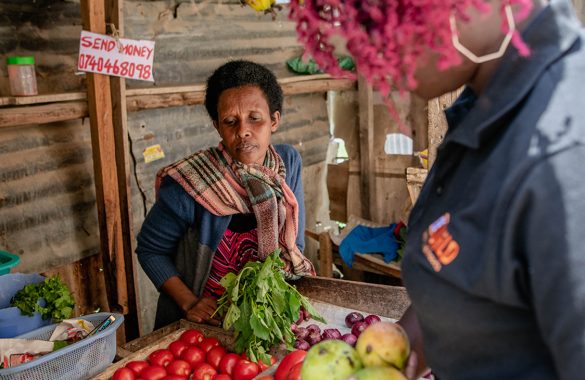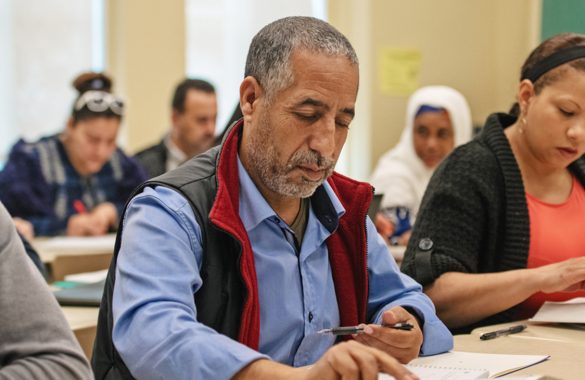
For refugees, social media plays a central role in avoiding threats in their host countries, identifying safe travel routes, and finding longer-term opportunities such as access to work or education. At the same time, undependable, incomplete, and inaccurate information can result in wasting extremely limited resources—or worse, can put refugees’ lives in peril. To reduce this “information precarity,” governments and humanitarian organizations have devoted substantial resources to providing official sources of online information to refugees during times of crisis.
But are these efforts reaching refugees? How do they engage with the online information ecosystem? These are some of the questions IPL researchers set out to answer in a study of Facebook pages intended to support Syrian refugees.
The Challenge
Syria’s civil war has produced the world’s largest refugee crisis, forcing over 5.5 million Syrians into neighboring countries and displacing more internally. Fleeing violence and poverty, often with only a cell phone, Syrian refugees have relied on information they find on social media to navigate a path to safety and seek a stable life outside of the country. Rapidly-changing conditions on the ground in Syria and shifting policies in countries of asylum can fuel rumors and disinformation that leaves refugees vulnerable to costly errors or exploitation.
The Study
While existing research on how crisis-affected Syrians access online information has established the key platforms and means of access, less is known about what types of information they have access to or choose to engage with. IPL was interested in understanding how the content, tone, and popularity of posts on Facebook—the most widely-used social media platform among Syrians—differed across those linking to official and unofficial sources of information.
Analyzing 143,201 posts, 802,173 comments, and metadata on public Arabic-language Facebook pages built for Syrian refugees from 2013 to 2018, IPL researchers were able to capture a picture of this online ecosystem and user behavior.
The majority of Facebook pages included in the analysis either targeted specific communities of refugees, provided information about asylum, or focused on relevant local events. A smaller number of pages included those offering information on smuggling services as well as those run by official organizations such as the United Nations High Commissioner for Refugees (UNHCR), the International Rescue Committee (IRC), and Mercy Corps.
Within these Facebook pages, the researchers categorized specific posts by the type of information source they linked to:
- Official sources – content produced by governments, NGOs, or international organizations
- Unofficial sources – websites or content from Facebook pages that are devoted to migration information but have no known affiliation
- News sources – websites or content from Facebook pages affiliated with news outlets that employ professional journalists
During the study period, several governments and humanitarian organizations launched new online resources designed to combat misinformation and rumors. These include Refugee.Info, a hub launched in 2015 by Mercy Corps and IRC, and InfoMigrants, an EU-funded website designed to counter misinformation for refugees settling abroad published in 2016. Alongside other longstanding sources of online information for refugees such as UNHCR, Amnesty International, and government migration agencies, these new platforms helped meet the demand for timely and accurate information.
Findings
Unofficial sources were posted on public Facebook pages at a much higher rate than official or news sources. Over the study period, official websites and pages never constituted more than 10% of posts and links to news sources never constituted more than five percent of posts (Figure 1).
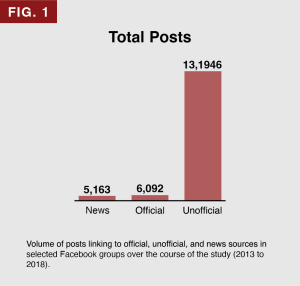
The number of posts peaked at the height of the refugee exodus from Syria in late 2015. While posts linking to unofficial and news sources declined after this point, the monthly volume of links to official sources began to increase again in mid 2016 and continued to grow until the end of the study period in 2018 (Figure 2).
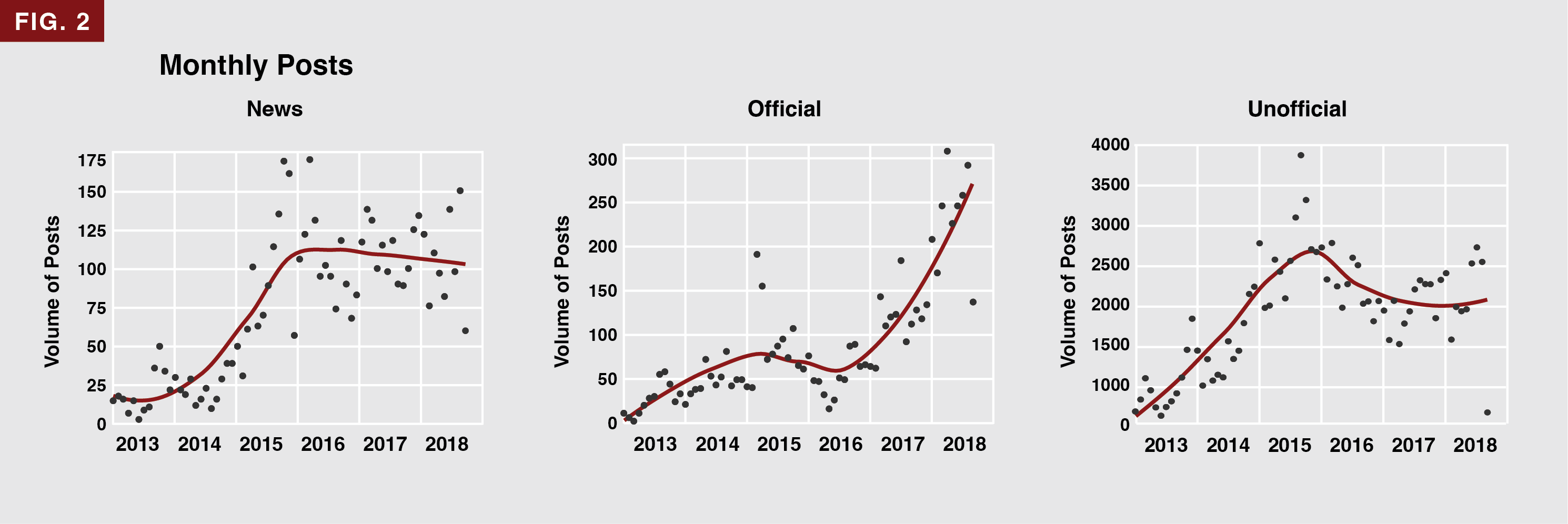
While unofficial sources constitute the greatest volume of posts, users shared, reacted to, and commented on posts linking to official sources more often (Figure 3). In 2016, there was an increase in monthly engagement with posts from official sources, which coincides with the entrance of new official information platforms targeting refugees, such as RefugeeInfo and InfoMigrants (Figure 4).

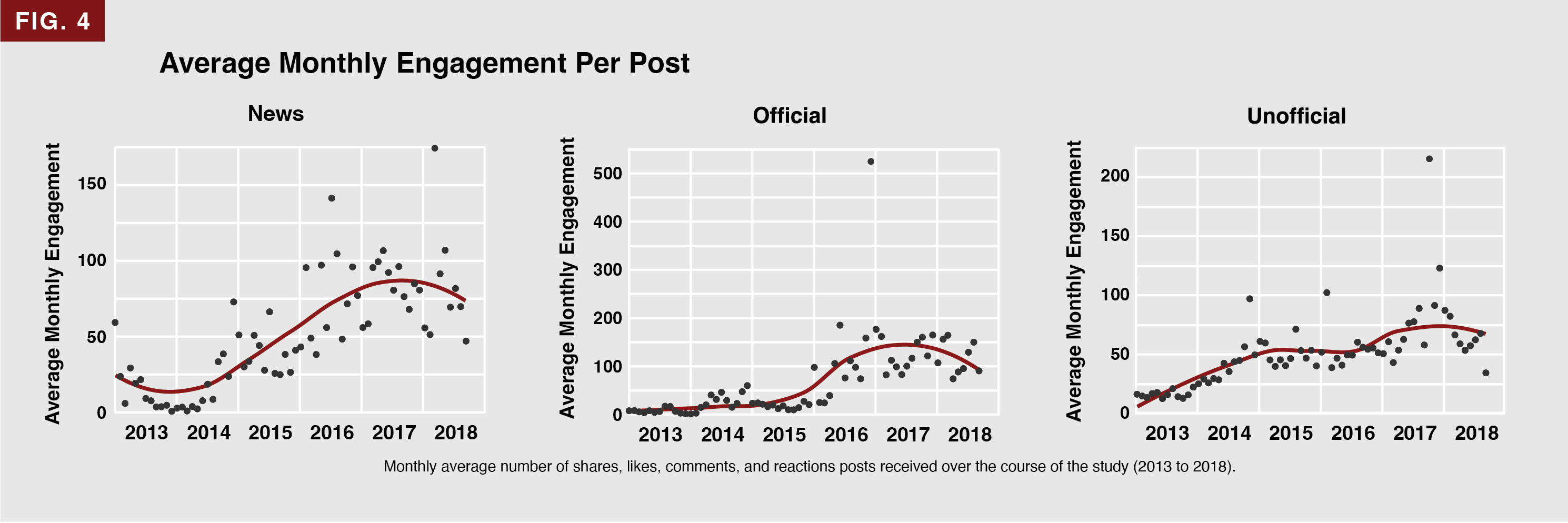
Topic
To ensure the difference in engagement the researchers were seeing was not simply a reflection of the varying rates at which sources provide information about different topics, they analyzed how post topic and engagement compared across each source type. Up until 2015, official sources offered much less coverage of many of the topics refugees were most interested in, including asylum procedures, access to education and health care, overseas travel, and smuggling. But beginning in 2016 with the peak in the Syrian exodus, new official sources entered the scene and began to cover these topics at higher rates than unofficial sources. Across the whole study period, official sources received higher levels of engagement across all topics, with particularly high engagement on the topics of asylum and smuggling.
Tone
To see how the tone of posts affected engagement, the research team developed a measure to assess whether posts were broadly encouraging or discouraging refugees to travel or settle in a particular host country. Using a text analysis method that quantifies how the meaning and context of words varies across circumstances, the team was able to evaluate the degree to which migration is encouraged over time and on different types of Facebook pages. These results were checked against those produced through human coding by Syrian native Arabic-speaking research assistants.
- Encouraging tone offered travel advice or services, emphasized that it was possible to travel somewhere or to apply for asylum in a particular country, or described the benefits of living in a particular country and how to remain or access services there.
- Discouraging tone discussed obstacles to traveling to a particular country or described the challenges or risks for Syrian refugees living in a particular country.
The researchers found that Facebook users in the study engaged with encouraging posts linking to news and official sources more often than with discouraging posts.
Conclusions
The urgency of fleeing during a crisis and the complexities of rapidly-changing policy environments often force refugees to rely on unofficial sources to make decisions that affect their immediate and long-term well being. Though false, incomplete, or potentially detrimental information is likely to remain a feature of the online social media environment, IPL’s study suggests that efforts by humanitarian organizations can help cut through the noise. While unofficial information sources dominated in overall volume of posts, the users in the Facebook groups studied actually engaged with posts linking to official sources more often, regardless of the topic or tone of the message. Once more official information became available on key topics of interest—particularly asylum, land travel, and sea travel—refugees engaged with this information at higher rates. Our data suggests that the efforts by additional governments and NGOs to provide accurate information online contributed to increased engagement with official information sources seen beginning in early 2016.
For governments and NGOs, this research suggests that the up-to-date and trustworthy information they provide reaches users, even in spaces crowded with content from unofficial sources. It also highlights the importance of considering how the content and tone of their messaging influences its uptake. Focusing on sharing advice and information on how to safely travel, apply for asylum, or access services can potentially help increase the reach of, and engagement with, their posts. In today’s digital age, this sort of information provision is an increasingly critical element of emergency response. Understanding what information is shared and how refugees interact with it can help guide efforts to empower refugees to make safe, informed choices for themselves and their families.
LOCATION
Online
RESEARCH QUESTION
How do refugees and asylum seekers engage with the online information ecosystem?
TEAM
Alexandra A. Siegel
Immigration Policy Lab, Stanford
Jessica Wolff
Immigration Policy Lab, Stanford
Jeremy Weinstein
Faculty Co-Director of the Immigration Policy Lab, Stanford
RESEARCH DESIGN
Descriptive
KEY STAT
Despite an abundance of posts from less trustworthy sources, users of Facebook pages for Syrian refugees liked and shared posts linking to official sources more often.


